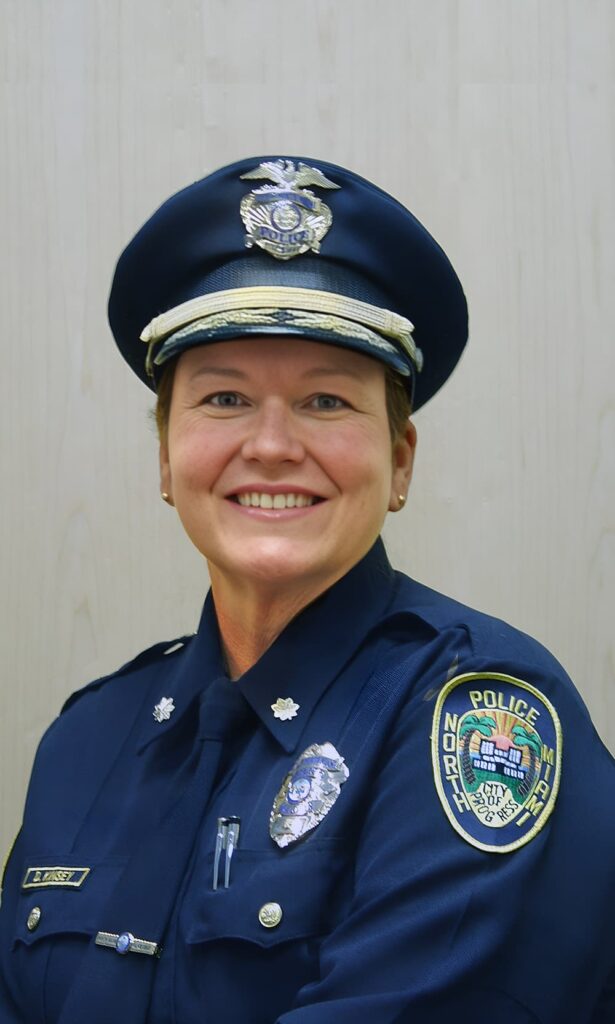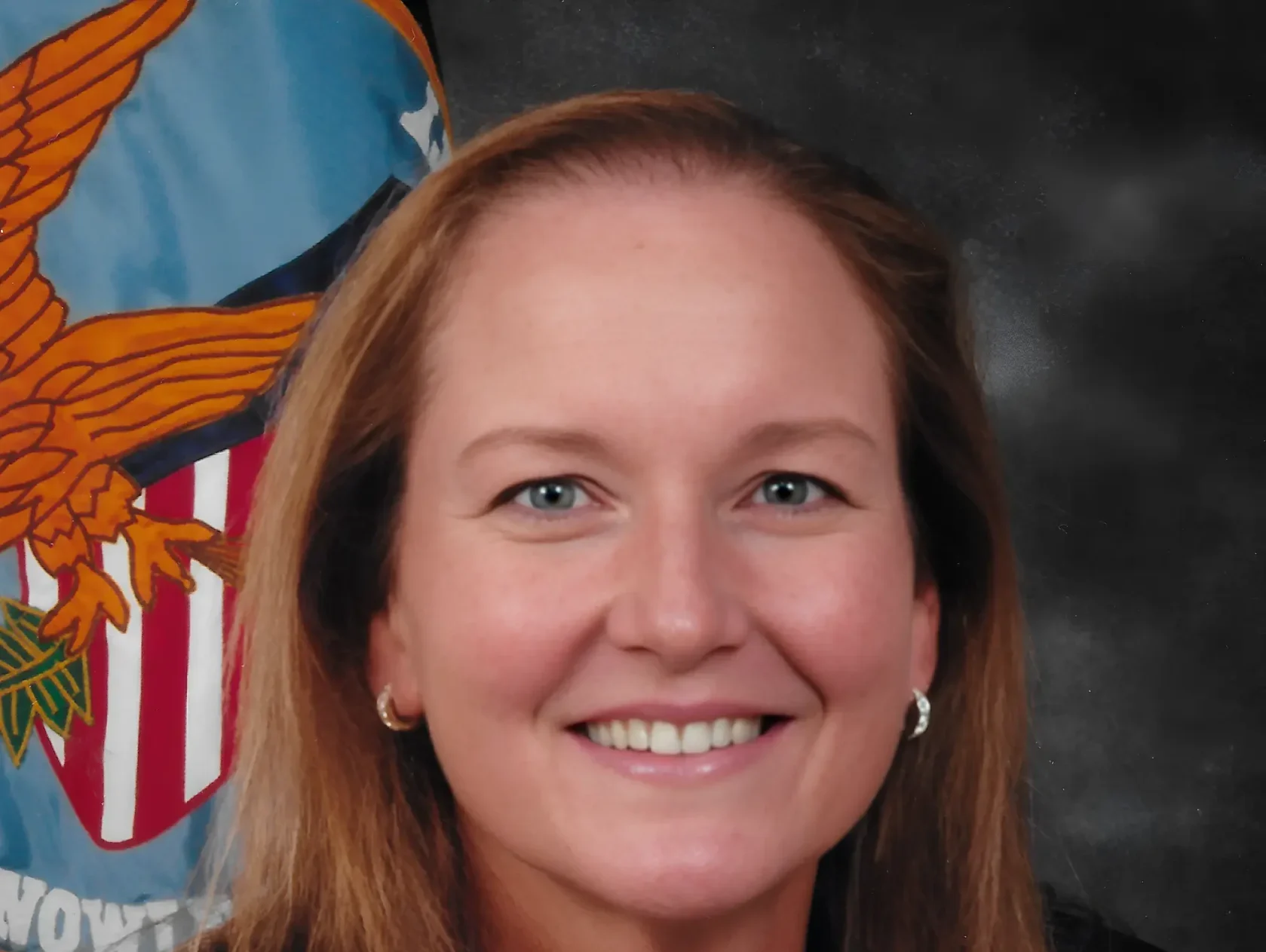The flashing red and blue lights of a motorcycle patrol unit sparked a five-year-old’s dream that would evolve into a mission spanning three decades and countless lives saved. Major Donna Kinsey‘s journey from watching her uncle, a Miami-Dade Police Department motorcycle officer patrol the streets, to founding one of the nation’s most innovative safety training organizations represents more than career progression—it’s a testament to how personal calling can transform into public service at the highest level.
As Founder and President of TEC III – Training Enhancement Center in Elkton, Virginia, Major Kinsey (RET.) has revolutionized how we approach personal safety and violence prevention. Her unique ‘Survival Mindset’ training program fills a critical gap in civilian protection by equipping individuals with the knowledge and skills to identify risks and take proactive steps to avoid potential attacks.
The Making of a Law Enforcement Leader
“From the age of five, I knew I wanted to become a police officer,” Major Kinsey recalls, her voice carrying the certainty of someone whose path was illuminated early. “My uncle would sound the siren, let me sit on the motorbike, wear his helmet, and pretend to talk to dispatch on the police radio. From that moment, I was certain I would one day follow in his footsteps.”
That childhood certainty translated into a nearly 30-year law enforcement career marked by groundbreaking achievements and barrier-breaking moments. Her ascent through the ranks—from patrol officer to Major—provided invaluable lessons in leadership evolution that now inform her training methodologies.
“Moving up in rank presents new leadership challenges,” she explains. “The role of a sergeant is distinctly different than that of a lieutenant, commander, or major. As your rank increases, so do your responsibilities. You learn to let go of the reigns and delegate more effectively. It teaches you to trust the people under your command to carry out the department’s mission.”
Breaking Barriers at the FBI National Academy
Perhaps no single experience shaped Major Kinsey’s approach to training more profoundly than her acceptance into the FBI National Academy—a distinction that made her the first woman in her department’s history to receive this honor. The competitive nature of admission to this premier law enforcement training academy cannot be overstated.
“Admission is fiercely competitive, and I was deeply honored to be the first woman in my department’s history to be nominated for acceptance into the academy,” she reflects. “The 10-week program, which I completed alongside 249 other law enforcement leaders from around the globe, was invaluable. It provided lessons from shared successes and failures, enhancing my ability to be a more effective leader.”
But the path to the FBI National Academy required more than professional excellence—it demanded personal transformation. When her police chief informed her that she would receive nomination if she could meet the demanding physical fitness requirements, Major Kinsey faced a life-defining choice.
“I realized that if I did not accept this challenge, I would regret it for the rest of my life,” she says. “Over 29 months, I lost over 100 pounds, got in shape, and was accepted into the FBI National Academy.” This personal victory became a powerful example of the resilience and determination she now teaches others.
From Investigation to Innovation
Major Kinsey’s diverse experience managing specialized units, including Domestic Violence and Missing Persons Investigative Units, provided crucial insights that would later shape her civilian training programs. Her assignment overseeing the department’s training division became a highlight of her career, where she discovered that traditional lecture-based approaches fell short of creating lasting behavioral change.
“A good trainer recognizes that individuals learn differently,” she notes. “I’ve incorporated interactive exercises, role play, group activities, and real-life scenarios into my programs. While lectures and PowerPoints are helpful, I find that they fall short of delivering training that transforms behavior.”
This philosophy of transformation over information became the cornerstone of her post-retirement mission. The founding of TEC III in 2007 emerged from a tragic recognition: too many victims sensed danger before attacks but dismissed their instincts.
The Genesis of Survival Mindset Training

The catalyst for Major Kinsey’s civilian safety training came from a heartbreaking case that illustrated a critical gap in public safety preparedness. “I’ve handled many cases where victims who fell prey to violent crime sensed that there was something before they were attacked,” she explains. “They noticed suspicious activity, like an unfamiliar car or feeling that they were being followed. In nearly every circumstance, the victim recalled that although they felt uncomfortable, they assumed everything would be fine…until it wasn’t.”
The turning point came with a tragic 2007 case involving a mother and daughter who were abducted and murdered at a prominent South Florida shopping mall. “This led me to develop training for civilians based on law enforcement survival techniques to help them recognize and avoid becoming victims,” she says.
While physical self-defense classes already existed, Major Kinsey identified something more fundamental was missing: “The ‘Survival Mindset’ course is designed to prevent attacks by teaching awareness and avoidance. Hence, filling the gap.”
The Science of Situational Awareness
Major Kinsey’s approach to safety training is grounded in understanding both human psychology and practical threat assessment. She recognizes that women possess unique advantages in threat detection that are often undermined by modern lifestyle pressures.
“Women have a unique sense of awareness and our bodies will tell us when there is something wrong if we are listening, but we often ignore it because we are addicted to busy,” she observes. This insight forms the foundation of her training methodology, which emphasizes developing and trusting intuitive threat assessment.
Her de-escalation training incorporates sophisticated understanding of non-verbal communication. “De-escalation relies on skilled communication, including non-verbal cues like facial expressions, body language, stance, and posture. All of which play an important role in controlling a situation,” she explains. “From a safety perspective, I would much rather control a situation by use of de-escalation skills rather than resort to physical force controlling techniques whenever possible.”
Beyond Subject Matter Expertise
As a certified high-liability training instructor, Major Kinsey understands that effective instruction requires more than technical knowledge. Her experience as a Firearms Range Master taught her valuable lessons about instructor selection that apply across all training disciplines.
“Subject knowledge and experience are crucial core elements, but it goes far beyond that,” she emphasizes. “Being a subject matter expert does not guarantee one will be a good trainer.” She recalls evaluating a top marksman and SWAT member for the firearms instructor team: “Despite his shooting skills, he lacked the temperament, patience, and traits required for an instructor.”
This understanding shapes her approach to training diverse audiences, from law enforcement professionals to college students to healthcare workers. “Effective policing and training require flexibility,” she notes. “As a trainer, you must know your audience and ensure that the training developed and delivered is tailored to the training participants’ abilities while meeting the course objectives.”
Measuring Success Through Transformation
For Major Kinsey, the true measure of training effectiveness lies not in information transfer but in behavioral transformation. “Knowing that my training participants will leave the room with a higher level of awareness and self-confidence. My end goal is always to transform behaviors,” she states.
Her philosophy extends beyond immediate skill acquisition to long-term preparedness: “I remind the audience that the time to think about what you will do in the event of a crisis is NOT during the crisis…have a plan…Train often, train well, and train as though your life depends on it. Someday, it will.”
Leadership Lessons Forged in Service
Major Kinsey’s leadership philosophy, shaped by decades of law enforcement experience, emphasizes courage over caution and growth over self-preservation. She particularly focuses on empowering women to overcome risk aversion that can limit their potential.
“I believe that women especially are afraid to take risks because of their fear of failure,” she observes, before sharing her key leadership principles:
Embracing Strategic Risk-Taking: “Failing to take risks can result in missed opportunities.”
Learning from Failure: “Expect to fail…I have learned way more from my failures than my successes, because failures sting and force us to transform our behaviors that we would otherwise not transform.”
Accountability and Growth: “Come to terms with the mistakes you make. Admit it, learn from it, rise above it, then people will respect you for it.”
Building Strong Teams: “Ensure that you have a well-rounded team to include people who are not afraid to tell you what you don’t want to hear!”
Perhaps most powerfully, she advocates for staying connected to all levels of an organization: “Spend time in the basement – As we move up vertically, we tend to forget about the people in the basement. Think of the belly of a ship as an analogy. The belly of the ship is what drives the ship. The captain steers the ship but those in the belly of the ship is what keeps it going.”
Knowledge as a Shared Resource
Major Kinsey’s commitment to developing others reflects her understanding that sustainable impact requires multiplication of expertise rather than hoarding of knowledge.
“Don’t be selfish with your knowledge – Teach them everything you know,” she advises. “Some leaders want to stifle growth of those below them to stay on top. As women we can’t afford to do that. We must teach those we are mentoring everything we know so they can build on the successes of others and continue to grow.”
This philosophy aligns with the FBI motto she embraces: “Flexible, Adaptable.” Drawing on Charles Darwin’s wisdom, she notes: “The species that survive aren’t the strongest species nor are they the most intelligent, but rather the ones who best adapt to change.”
Expanding Impact Through Strategic Partnerships
Major Kinsey’s role in the FBI Speakers Bureau has dramatically expanded her reach and influence. “Being part of the FBI National Academy Speakers Bureau has afforded me a wide range of exposures and outreach opportunities,” she explains.
As an instructor for Calibre Press—”considered the gold standard for law enforcement training for over 40 years”—she has trained hundreds of command-level professionals in the “Women in Command” program nationwide.
TEC III’s training audiences include home healthcare organizations, college campuses, professionals in the field, and various public and private organizations offering personal safety training.
Her particular focus on college campuses addresses a vulnerable population: “My goal is to expand the program to more colleges to reach vulnerable students who may overlook potential threats due to complacency or distraction.”
Building Effective Teams Through Diversity
Major Kinsey’s approach to team building reflects sophisticated understanding of organizational dynamics and human psychology. “Diversity of thought and diversity of talent,” she emphasizes as the foundation of effective teams.
“Putting all your top achievers on the same team can be counterproductive as each may try to assume the leadership role,” she explains. “Instead, diversify the talent with members who have different strengths and weaknesses.”
A Vision for Community Protection
Major Kinsey’s advice to aspiring trainers and law enforcement professionals emphasizes the fundamental importance of community connection and service. “Line personnel are the backbone of the department,” she notes. “They come face to face with the community, and they are the first line of defense when it comes to protecting the public.”
Her vision extends beyond reactive law enforcement to proactive community engagement: “Take time to educate members of your community by offering crime prevention and target hardening tips. Keep open lines of communication between members of the department and community leaders. Be available to meet with them and listen (and act) on their concerns.”
The Continuing Mission
Today, Major Donna Kinsey continues to bridge the gap between law enforcement expertise and civilian safety needs through TEC III – Training Enhancement Center. Her work represents a unique synthesis of street-level experience, academic rigor, and practical application that transforms how individuals and organizations approach personal safety and violence prevention.
From that five-year-old girl mesmerized by flashing red and blue lights to a nationally recognized safety advocate training thousands of professionals and civilians, Major Kinsey’s journey illustrates how childhood dreams can evolve into life-saving missions. Her “Survival Mindset” training programs don’t just teach skills—they transform perspectives, empower individuals, and ultimately save lives by preventing violence before it occurs.
As she continues to expand her training programs and develop new approaches to safety education, Major Kinsey remains guided by the same principle that has driven her entire career: the understanding that the time to prepare for crisis is not during the crisis, but long before it arrives. In a world where threats constantly evolve, her commitment to adaptive, transformative training ensures that those she serves are not just informed, but truly prepared.






